RBI to Increase Repo Rate by 50 BPS, GDP growth at 7.2% and inflation at 6.7%
As per the prediction of economists and market experts, the RBI (Reserve Bank of India) is expected to raise its policy Repo rate by 50 basis points (bps) to 4.90% on June 8 2022 and increase the inflation prediction for the current financial year to above 6% from its previous expectation of 5.7%. In a recent interview RBI Governor Shaktikanta Das stated that rate hikes in June were a no-brainer.
As the ongoing inflation has already crossed the tolerance limit of the central bank for several months, the 6 member Monetary Policy Committee (MPC) of RBI is almost certain to hike policy interest rates. While a hike in the rate is unavoidable, as stated by Das in June, the question raises is by how much.
According to the recent studies, India's Consumer Price Index (CPI)-based inflation in April hit an 8-year high of 7.79%. It has been above 6% since January.
According to Suvodeep Rakshit, Senior Economist of Kotak Institutional Equities, it is expected that the RBI will hike repo rate by 50 bps in its June policy meeting. However, we must be open for a hike of 35 - 50 bps in the rate depending on how the MPC wants to accomplish the pre-pandemic repo rate of 5.15% or around by the end of August policy.
RBI raised the policy repo rate by 50 bps or 0.50%, to 4.4% in May at its off-cycle monetary policy review. The policy repo rate was increased for the first time in about two years. The repo rate is the rate of interest at which the RBI lends short-term cash to the banks. Since the start of the year, inflation has been above the target range of RBI’s 2 - 6%.
In a research note, Bank of America Securities said that in May, the retail inflation is likely to be around 7.1%. During the current financial year, CPI-based inflation is likely to average 6.8%.
The RBI is expected to hike its inflation projection for the current financial year to above 6%, given the recent rise in inflationary pressure. The RBI increased its inflation forecast for the current fiscal year to 5.7% in April, up from 4.5% in February.
As per the Bank of America Securities, the central bank is likely to further hike its inflation expectation for the current fiscal year to 6.5% and it is likely to do this upward revision in the inflation projection next week or in August.
Rakshit said that along with the hike in repo rate, the RBI will also revise its inflation estimates higher, which is possibly indicating inflation remaining close to 7% for the most part of CY 2022. He also said that the RBI is expected to continue focusing on taking inflation and signaling its intent to keep raising rate & normalizing liquidity, while not losing it's on growth entirely given the uneven nature of growth recovery.
Churchil Bhatt, Executive Vice President of Kotak Mahindra Life Insurance Company, said pitching for a need to hike policy rates that failure to contain the inflation genie should scare the market more than the policymaker's fight against it. The MPC is expected to deliver a no-brainer hike in policy rate by 25 - 40 bps in June.
According to Bank of America Securities, it is expected that the RBI will boost the policy rate by 0.40% next week and by another 0.35% in August.
According to a HDFC Bank Treasury Research Desk’s study, the RBI is expected to boost the policy rate by 25 bps while maintaining its stance and Cash Reserve Rate (CRR). It said that it tilts on the side of a 25 bps rate hike instead of 50 bps raise as it does not see a compelling case for a larger rate hike at this stage. It expects RBI to lower its inflation projection from 5.7% to 70 – 80%, noting changes in global & domestic price pressures.
RBI is likely to raise its key policy rates by up to 50 bps, according to Saransh Trehan, the Managing Director of Trehan Group. The hike will eventually be passed on to the borrowers from banks. However, he believes that given the current historically low mortgage rates, it will have little effect on demand.
